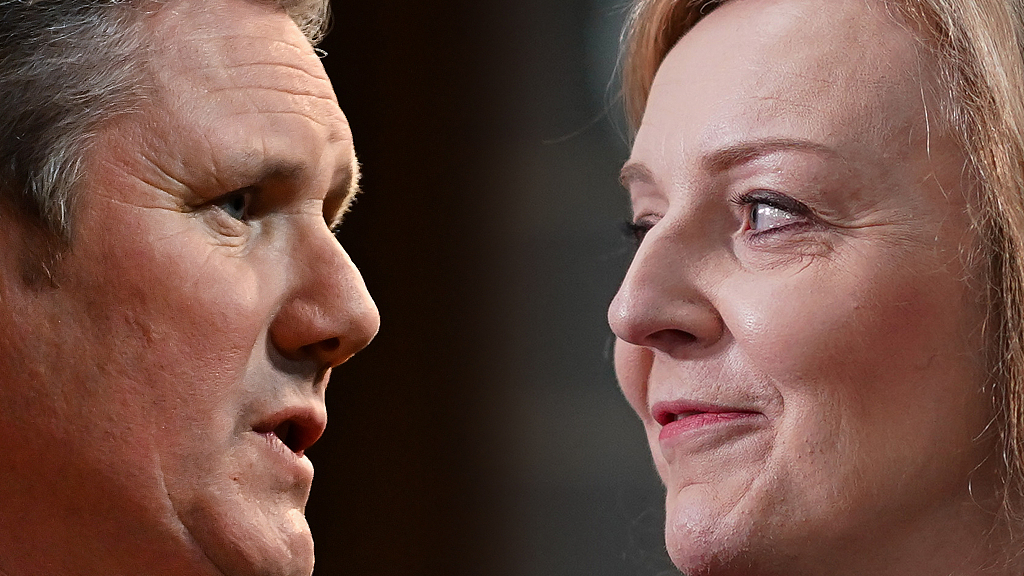
In this composite image, a comparison has been made between the Prime Minister Liz Truss and the leader of the opposition and Labor Leader Keir Starmer. /CFP
In this composite image, a comparison has been made between the Prime Minister Liz Truss and the leader of the opposition and Labor Leader Keir Starmer. /CFP
Editor's note: Thomas O. Falk is a London-based political analyst and commentator. He holds a Master of Arts in international relations from the University of Birmingham and specializes in U.S. affairs. The article reflects the author's opinions and not necessarily the views of CGTN.
United Kingdom's Labor leader Keir Starmer has led his party from the far left to the center. With new Prime Minister Liz Truss alienating many British voters, he seeks to bring his party back to power. His chances are good, especially if Truss's vision fails.
Times in Great Britain are serious. Energy prices are going through the roof and the economy is in shambles. What's required is an operational government with coherent plans to lead the country out of its downward spiral.
Conservative Prime Ministers Theresa May and Boris Johnson failed to provide stability during their tenures, albeit during Brexit and the pandemic. Nonetheless, political conditions were supposed to get better under Truss. But in the wake of the crises and the "answers" Truss has offered to date, the Tories are confronting an uncertain future — as well as the country itself.
"A crisis is a terrible thing to waste," Paul Romer, Stanford economist, once said. It is precisely this credo that the Labor Party will now utilize. Since 2010, it has been out of power. Thanks to Truss, the Tories will feel the brunt of the public's dissatisfaction, which improves the chances for the revival of a Labor Prime Minister in 2024 that could likely be led by Keir Starmer.
Ironically, Starmer and his party have contributed little to enjoy such positive prospects. Instead, the primary reason for the lucky turn is on account of the first four weeks of Truss's tenure. The growth plans recently presented by her Chancellor of the Exchequer, Kwasi Kwarteng, are intended to mitigate the crisis with trickle-down economics, but were not well received by voters.
Truss plans to introduce the most significant tax cuts in the past 50 years and seeks to finance her undertakings with new debt. But the problem is that her tax cuts primarily benefit high-income earners, while the package doesn't offer much for Britain's middle and working classes. The markets reacted instantly and sent the pound to historic lows, while interest rates on British government bonds surged higher, along with sparking more jitters in the real estate market.

Pedestrians walk past a board displaying the price of euro and U.S. dollars against British pound sterling, outside a currency exchange store in central London, England, September 27, 2022. /CFP
Pedestrians walk past a board displaying the price of euro and U.S. dollars against British pound sterling, outside a currency exchange store in central London, England, September 27, 2022. /CFP
Bear in mind, under Truss, the party has sought to rebound from the turbulent Johnson years. Yet, the opposite has become the case. Even Johnson could arguably have led the party to an election win, despite his various personal scandals. Under Truss on the other hand, matters look more bleak.
A YouGov poll released on September 29, conducted after the Chancellor of the Exchequer's announcements, Labor is polling ahead of the Tories by over 33 percentage points – figures never seen in any published survey since the late 1990s. Even worse for the Tories: These figures do not reflect how Truss offers Labor some new areas of attack that did not exist under Johnson.
The latter had the ability to be politically opportunistic, scoring – in part – even with elements of the climate movement and with former and now disillusioned Labor voters in the country's old industrial towns. This made it difficult for Starmer to find areas to attack and to mobilize the same voters.
Nevertheless, Truss is not a political opportunist. She is ideologically very conservative. Johnson's climate initiatives and promises to support the broken infrastructure in former industrial areas have been replaced with Truss relaxing the ban on fracking while also stopping the banker bonuses' caps. Accordingly, Starmer has new angles for attacks.
At the party conference last week, Starmer also presented his responses to many questions plaguing the country. Above all, he advocates for healthy state finances and to reduce public debt and compensate for additional budgetary expenditures. How this would be achieved was not directly addressed. But in the current situation, this gets hardly noticed. Anything other than the status quo is most attractive to voters.
Besides the Truss factor, Starmer has managed to change the face of the party, making it more attractive to voters. After the years under Jemery Corbyn, under which the party drifted sharply to the left and was no longer electable for people from the center, Starmer has managed to reposition the party. Meanwhile, he united the party internally with all its different ideological fractions and mostly freed it from the grip of Corbyn's supporters.
Starmer and Labor are thus in prime condition.
Meanwhile, Truss hopes markets will calm down and that her tax cuts and reforms will lead to more economic growth. However, the bet is risky, and the stakes are so high. If it doesn't work out, this winter could not only be hard for the British but for Truss if poor polling results continue to overwhelm her.
(If you want to contribute and have specific expertise, please contact us at opinions@cgtn.com. Follow @thouse_opinions on Twitter to discover the latest commentaries on CGTN Opinion Section.)